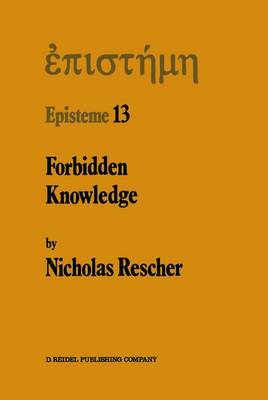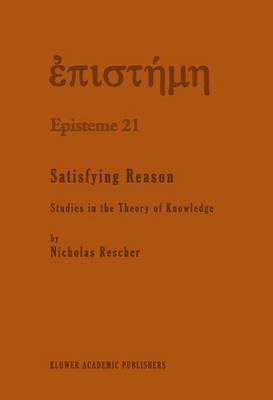Episteme
2 primary works
Book 13
This volume collects together eleven essays in epistemology, written during the past three years. They are mostly unpublished, just four of them having appeared previously (numbers two, three, four and eleven). Detailed acknowledgement of prior publication is made in the notes to the relevant chapters. I am indebted to the editors of the several publications involved for their kind permission to use this material. And I am particularly grateful to my friend, Professor Mario Bunge, for his interest in my work and for his willingness to include this sample of it in his 'Episteme' series. NICHOLAS RESCHER Pittsburgh, PA December, 1986 xi INTRODUCTION The philosophy of knowledge covers a vast and enormously diversified terrain. Within this broad area, the essays that comprise the present book deal specifically with the following issues: 1. The moral dimension of inquiry - in particular, scientific inquiry into the ways of the world (Chapter 1) 2. The epistemic status of such cognitive 'values' of inquiry as - coherence (Chapter 2) - consistency (Chapter 3) - completeness (Chapter 4) 3. The cognitive bearing of probabilistic considerations (Chapters 5 and 6) 4. The epistemic status of certain ideal desiderata of cognition, such as - totality (Chapter 7) - precision (Chapter 8) - exactness (Chapter 9) 5.
Book 21
Leibniz said with a mixture of admiration and inspiration that the Duchess Sophie of Hannover always wanted to know the reason why behind the reason why. And that is just how rationality works: it wants to leave no loose ends to understanding, seeking to enable us to understand things through to the bitter end.
In the twelve chapters that make up Satisfying Reason, Rescher develops and defends the following perspective:
In the twelve chapters that make up Satisfying Reason, Rescher develops and defends the following perspective:
- That rationality is a cardinal virtue in cognitive matters.
- That this is not something simple and cut-and-dried: in the pursuit of truth through the development of knowledge we face obstacles -- sometimes even insuperable ones.
- All that we can do is the best we can, realizing that even our very best may still be imperfect.
- Nevertheless, the venture is far from hopeless. While absolutes are unattainable in the cognitive venture, some solutions are situationally optimal, being comparatively the best that can be managed under the circumstances.
- That reason itself enables us to come to terms with this state of affairs, urging us to accept the best we can do as good enough.

